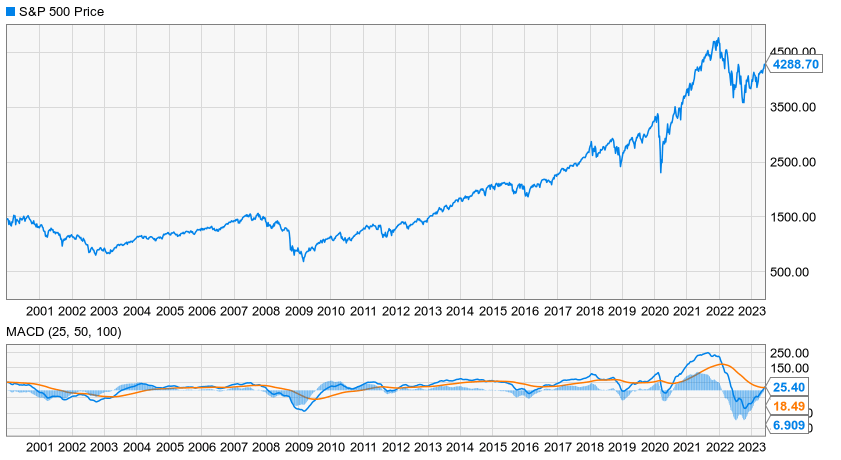Market Overview
This month's models have been posted. There are NO CHANGES in the models.
“O, Mighty Robot Overlords, We Welcome You”
Greetings to our worthy and beneficent masters! May Artificial Intelligence reign for all time!
(Do you think that fooled them? Can we now talk about how to make money off AI?)
You might already have seen the effect AI has had on IT hardware. Last month, Nvidia’s stock price went from $300 to $375 in a day because of the chip maker’s exposure to the AI market. “Waves of innovation often create giants. Microsoft rode the upsurge in desktop computers, as Apple did with the smartphone. [AI] may well be the next big technological shift, transforming the way businesses are run and society functions,” according to a June 1 article in The Economist. “If so, plenty of firms selling the software and hardware that underpin AI stand to gain. But none is better positioned than Nvidia, an American firm that makes specialist AI chips. Its market value briefly passed $1 trillion this week. Will AI sweep Nvidia to big tech-dom?”
But the opportunities – and the risks – go far beyond who gets to make the bots’ physical parts.

Are we the ones the ‘droids are looking for? Credit: Signature Films
Automated assistance
If you think about it, chip making is just another manufacturing process. Intuitively, Nvidia’s factories would seem to be the only ones that would benefit from AI. But such is not the case. According to the Forbes Technology Council, Manufacturing more broadly would be the sector with the most to gain from this innovative technology.
“Businesses can apply artificial intelligence and machine learning techniques to reduce task time, increase accuracy, handle administrative tasks and so on,” according to Council member Tamas Kadar, CEO of data security firm SEON.
Aside from that, though, a lot of winners from the AI revolution are exactly the ones you’d expect, according to the Forbes brain trust. Autonomous vehicles should benefit from improvements in navigation. Medical testing and diagnosis can automate tasks that now require highly trained and skilled human beings. Customer experience – via online shopping or banking or content curating – could be a big beneficiary of AI, as could the call center you contact when the customer experience is still less than perfect.
Kadar’s own field, cybersecurity, stands to benefit. So does retail sales, which would be able to erect higher barriers to prevent fraud. Of course, software development and content creation – the whole purpose of ChatGPT – are already surging due to AI assistance.
The Forbes panel also sees some advantages to some legacy industries that adopt AI enablement. Tops among them is education.
“AI has the potential to benefit education by enabling holistic analysis and instructional optimization so each individual can achieve their full potential, rather than simply optimizing performance against a standard,” according to CEO Chitra Sivanandam of national security firm Reinventing Geospatial.
Further, energy companies can fine-tune their carbon emission markets. Even farmers could benefit not only from better weather prediction, but also better modeling for supply chains – both for buying inputs and for forecasting demand for agricultural products.
To be terminated
There’s going to be a lot of creative disruption going on. We can’t tell you which companies are going to be disrupted but reinvent themselves to stay current and which ones will be demolished. Who knew that PNC Bank – a sleepy, Pittsburgh-area depositary founded in 1845 – would become a leading online financial services player? Who knew that Blockbuster Video would be smacked down by Netflix?
Here’s what we can tell you. While the tech sector itself is secure, most of the entry- and mid-level jobs are on shaky ground. AI can already do most the work of coders, programmers, software engineers and data analysts, according to Business Insider. A lot of media jobs are also going away. Maybe it’s sheer optimism, but we don’t think writing newsletters is one of them. The click-bait and direct-mail functions can be automated now, as can a lot of technical writing. There are a lot of journalism tasks that could probably be done better by bots. Hopefully, though, there are still a few years left for creative, analytical writers. If we’re wrong about that, we’ll just have ChatGPT update our resume.
And yet, writers might be keeping their jobs longer than financial advisors, according to the Business Insider article.
"AI can identify trends in the market, highlight what investments in a portfolio are doing better and worse, communicate all that, and then use various other forms of data by, say, a financial company to forecast a better investment mix," according to the Brookings Institution’s Mark Muro.
It might be cold comfort for advisors, but other financial services professionals might find themselves out of work first, especially securities traders who already basically play a video game for a living.
Graphic designers could be in for some tough sledding. Accountants too. Administrative assistants of every kind might soon be virtual – even paralegals. Same with market researchers.
The firms that thrive will be the ones that up-skill their current work force and recruit new talent that can leverage AI rather than perform tasks that bots can. Even if they can do it faster and better than any other human alive, if they can’t do it faster and better than the machines, it just doesn’t matter.
Seeing the Matrix
Of course, none of this will matter if the warning of some of the AI industry’s leading – human – voices is not heeded.
“Mitigating the risk of extinction from AI should be a global priority alongside other societal-scale risks such as pandemics and nuclear war,” according to the Center for AI Safety, a consortium of machine-learning CEOs.
And on that cheery thought, we suggest that you consider the effects of AI on the components of your securities portfolio. In 1900, there were 13,000 buggy whip manufacturers in the U.S. Twenty years later, there were effectively zero. Those who invested in the last buggy whip business all wished they’d have bought into the first internal combustion engine business. A trusted financial advisor might help you weigh the prospects of highly productive companies that make obsolescent products and toddler-stage companies that own the future.





